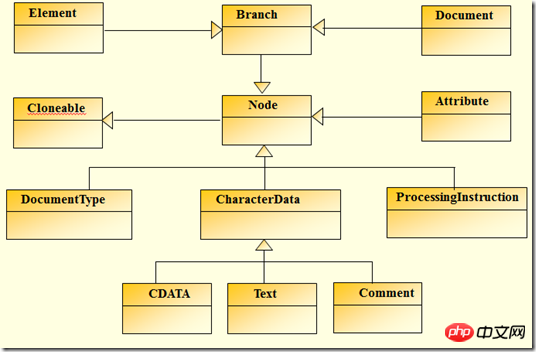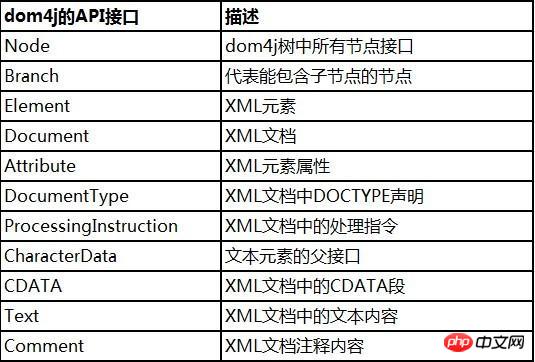Home >Backend Development >XML/RSS Tutorial >Share a method of parsing an xml string through dom4j
Share a method of parsing an xml string through dom4j
- Y2JOriginal
- 2017-05-04 15:46:122487browse
DOM4J
## Compared with using DOM, SAX, and JAXP mechanisms to parse xml, DOM4J performs better, has excellent performance, powerful functions, and is extremely easy to use. With the characteristics of use, as long as you understand the basic concepts of DOM, you can parse xml through dom4j's api document. dom4j is a set of open source APIs. In actual projects, dom4j is often chosen as a tool for parsing xml.
Let’s first take a look at the inheritance relationship established by the DOM tree corresponding to XML in dom4j


constants when traversing the xml document.
Commonly used API
##class Document- iterator Use this method to get node
- getName Get the node name, for example, get the root node name as bookstore
- attributes Returns the
- attributes attributeValue Gets the attribute value based on the passed-in attribute name
-
##interface org.dom4j.Attribute
getName Get the attribute name
-
getValue Get the attribute value
-
interface org.dom4j.Text
getText Get the Text node value
-
interface org.dom4j.CDATA
getText Get the CDATA Section value
-
interface org. dom4j.Comment
getText 获取注释
实例一:
1 //先加入dom4j.jar包 2 import java.util.HashMap; 3 import java.util.Iterator; 4 import java.util.Map; 5 6 import org.dom4j.Document; 7 import org.dom4j.DocumentException; 8 import org.dom4j.DocumentHelper; 9 import org.dom4j.Element; 10 11 /** 12 * @Title: TestDom4j.java 13 * @Package
14 * @Description: 解析xml字符串 15 * @author 无处不在 16 * @date 2012-11-20 下午05:14:05 17 * @version V1.0
18 */ 19 public class TestDom4j { 20 21 public void readStringXml(String xml) { 22 Document doc = null; 23 try { 24 25 // 读取并解析XML文档 26 // SAXReader就是一个管道,用一个流的方式,把xml文件读出来 27 // 28 // SAXReader reader = new SAXReader(); //User.hbm.xml表示你要解析的xml文档 29 // Document document = reader.read(new File("User.hbm.xml")); 30 // 下面的是通过解析xml字符串的 31 doc = DocumentHelper.parseText(xml); // 将字符串转为XML 32 33 Element rootElt = doc.getRootElement(); // 获取根节点 34 System.out.println("根节点:" + rootElt.getName()); // 拿到根节点的名称 35 36 Iterator iter = rootElt.elementIterator("head"); // 获取根节点下的子节点head 37 38 // 遍历head节点 39 while (iter.hasNext()) { 40 41 Element recordEle = (Element) iter.next(); 42 String title = recordEle.elementTextTrim("title"); // 拿到head节点下的子节点title值 43 System.out.println("title:" + title); 44 45 Iterator iters = recordEle.elementIterator("script"); // 获取子节点head下的子节点script 46 47 // 遍历Header节点下的Response节点 48 while (iters.hasNext()) { 49 50 Element itemEle = (Element) iters.next(); 51 52 String username = itemEle.elementTextTrim("username"); // 拿到head下的子节点script下的字节点username的值 53 String password = itemEle.elementTextTrim("password"); 54 55 System.out.println("username:" + username); 56 System.out.println("password:" + password); 57 } 58 } 59 Iterator iterss = rootElt.elementIterator("body"); ///获取根节点下的子节点body 60 // 遍历body节点 61 while (iterss.hasNext()) { 62 63 Element recordEless = (Element) iterss.next(); 64 String result = recordEless.elementTextTrim("result"); // 拿到body节点下的子节点result值 65 System.out.println("result:" + result); 66 67 Iterator itersElIterator = recordEless.elementIterator("form"); // 获取子节点body下的子节点form 68 // 遍历Header节点下的Response节点 69 while (itersElIterator.hasNext()) { 70 71 Element itemEle = (Element) itersElIterator.next(); 72 73 String banlce = itemEle.elementTextTrim("banlce"); // 拿到body下的子节点form下的字节点banlce的值 74 String subID = itemEle.elementTextTrim("subID"); 75 76 System.out.println("banlce:" + banlce); 77 System.out.println("subID:" + subID); 78 } 79 } 80 } catch (DocumentException e) { 81 e.printStackTrace(); 82 83 } catch (Exception e) { 84 e.printStackTrace(); 85 86 } 87 } 88 89 /** 90 * @description 将xml字符串转换成map 91 * @param xml 92 * @return Map 93 */ 94 public static Map readStringXmlOut(String xml) { 95 Map map = new HashMap(); 96 Document doc = null; 97 try { 98 // 将字符串转为XML 99 doc = DocumentHelper.parseText(xml);
100 // 获取根节点101 Element rootElt = doc.getRootElement();
102 // 拿到根节点的名称103 System.out.println("根节点:" + rootElt.getName());
104 105 // 获取根节点下的子节点head106 Iterator iter = rootElt.elementIterator("head");
107 // 遍历head节点108 while (iter.hasNext()) {109 110 Element recordEle = (Element) iter.next();111 // 拿到head节点下的子节点title值112 String title = recordEle.elementTextTrim("title");
113 System.out.println("title:" + title);114 map.put("title", title);115 // 获取子节点head下的子节点script116 Iterator iters = recordEle.elementIterator("script");
117 // 遍历Header节点下的Response节点118 while (iters.hasNext()) {119 Element itemEle = (Element) iters.next();120 // 拿到head下的子节点script下的字节点username的值121 String username = itemEle.elementTextTrim("username");
122 String password = itemEle.elementTextTrim("password");123 124 System.out.println("username:" + username);125 System.out.println("password:" + password);126 map.put("username", username);127 map.put("password", password);128 }129 }130 131 //获取根节点下的子节点body132 Iterator iterss = rootElt.elementIterator("body");
133 // 遍历body节点134 while (iterss.hasNext()) {135 Element recordEless = (Element) iterss.next();136 // 拿到body节点下的子节点result值137 String result = recordEless.elementTextTrim("result");
138 System.out.println("result:" + result);139 // 获取子节点body下的子节点form140 Iterator itersElIterator = recordEless.elementIterator("form");
141 // 遍历Header节点下的Response节点142 while (itersElIterator.hasNext()) {143 Element itemEle = (Element) itersElIterator.next();144 // 拿到body下的子节点form下的字节点banlce的值145 String banlce = itemEle.elementTextTrim("banlce");
146 String subID = itemEle.elementTextTrim("subID");147 148 System.out.println("banlce:" + banlce);149 System.out.println("subID:" + subID);150 map.put("result", result);151 map.put("banlce", banlce);152 map.put("subID", subID);153 }154 }155 } catch (DocumentException e) {156 e.printStackTrace();157 } catch (Exception e) {158 e.printStackTrace();159 }160 return map;161 }162 163 public static void main(String[] args) {164 165 // 下面是需要解析的xml字符串例子166 String xmlString = "<html>" + "<head>" + "<title>dom4j解析一个例子</title>"167 + "<script>" + "<username>yangrong</username>"168 + "<password>123456</password>" + "</script>" + "</head>"169 + "<body>" + "<result>0</result>" + "<form>"170 + "<banlce>1000</banlce>" + "<subID>36242519880716</subID>"171 + "</form>" + "</body>" + "</html>";172 173 /*174 * Test2 test = new Test2(); test.readStringXml(xmlString);175 */176 Map map = readStringXmlOut(xmlString);177 Iterator iters = map.keySet().iterator();178 while (iters.hasNext()) {179 String key = iters.next().toString(); // 拿到键180 String val = map.get(key).toString(); // 拿到值181 System.out.println(key + "=" + val);182 }183 }184 185 }实例二: 1 /** 2 * 解析包含有DB连接信息的XML文件 3 * 格式必须符合如下规范: 4 * 1. 最多三级,每级的node名称自定义; 5 * 2. 二级节点支持节点属性,属性将被视作子节点; 6 * 3. CDATA必须包含在节点中,不能单独出现。 7 * 8 * 示例1——三级显示: 9 * <db-connections>10 * <connection>11 * <name>DBTest</name>12 * <jndi></jndi>13 * <url>14 * <![CDATA[jdbc:mysql://localhost:3306/db_test?useUnicode=true&characterEncoding=UTF8]]>15 * </url>16 * <driver>org.gjt.mm.mysql.Driver</driver>17 * <user>test</user>18 * <password>test2012</password>19 * <max-active>10</max-active>20 * <max-idle>10</max-idle>21 * <min-idle>2</min-idle>22 * <max-wait>10</max-wait>23 * <validation-query>SELECT 1+1</validation-query>24 * </connection>25 * </db-connections>26 *27 * 示例2——节点属性:28 * <bookstore>29 * <book category="cooking">30 * <title lang="en">Everyday Italian</title>31 * <author>Giada De Laurentiis</author>32 * <year>2005</year>33 * <price>30.00</price>34 * </book>35 *36 * <book category="children" title="Harry Potter" author="J K. Rowling" year="2005" price="$29.9"/>37 * </bookstore>38 *39 * @param configFile40 * @return41 * @throws Exception42 */43 public static List<Map<String, String>> parseDBXML(String configFile) throws Exception {44 List<Map<String, String>> dbConnections = new ArrayList<Map<String, String>>();45 InputStream is = Parser.class.getResourceAsStream(configFile);46 SAXReader saxReader = new SAXReader();47 Document document = saxReader.read(is);48 Element connections = document.getRootElement();49 50 Iterator<Element> rootIter = connections.elementIterator();51 while (rootIter.hasNext()) {52 Element connection = rootIter.next();53 Iterator<Element> childIter = connection.elementIterator();54 Map<String, String> connectionInfo = new HashMap<String, String>();55 List<Attribute> attributes = connection.attributes();56 for (int i = 0; i < attributes.size(); ++i) { // 添加节点属性57 connectionInfo.put(attributes.get(i).getName(), attributes.get(i).getValue());58 }59 while (childIter.hasNext()) { // 添加子节点60 Element attr = childIter.next();61 connectionInfo.put(attr.getName().trim(), attr.getText().trim());62 }63 dbConnections.add(connectionInfo);64 }65 66 return dbConnections;67 }【相关推荐】
1. XML免费视频教程
2. XML技术手册
The above is the detailed content of Share a method of parsing an xml string through dom4j. For more information, please follow other related articles on the PHP Chinese website!

